 Jellies and syrup from the fruit can still be obtained since there are modern Indians and others who take the time to harvest, prepare and market them.
Jellies and syrup from the fruit can still be obtained since there are modern Indians and others who take the time to harvest, prepare and market them.The cactus wren atop this saguaro flower has a wait - fruit won't be ready till early July.

It was April 30 2003, the last day of a month that had been unusually mild for the central Arizona desert where Kitty had lived exclusively since 1975, until she joined Paul in Toronto in 2000. Temperatures at this time of the year typically are in the high 80s during the day, periodically reaching high 90s; breaking 100 is not unusual. This April was kind to Canadian Paul :>) and days were rarely above 80. During our stay since January in the house that she owns there, we had taken a few short walks in the nearby desert, but had not taken a camera with us. This particular morning we planned to go a different route, recording the event and the scenery.
It was about 8:30 when we set out that Wednesday morning, carrying breakfast with us which we planned to eat at the top of a small hill to the north and slightly west, just this side of the Gila River Indian Reservation fence line.
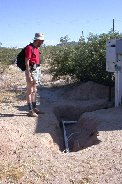
Before heading out, we stopped to see how the spliced piping for the automated watering of the roses looked after a night with water pressure. No leaks!
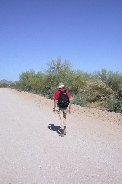
Before heading "cross-country", we walked westward on the road north of our property.
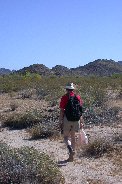
We're headed for the hill in the distance on the left. Paul made use of a plastic bag we'd brought along for our trash, to clean up some of the desert - unfortunately, there are a number of very inconsiderate individuals who just drop or throw their trash anywhere rather than disposing of it properly.
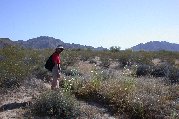
Along one of the many washes wild flowers are in bloom. The Sacaton Mountains in the distance are on the Gila River Indian Reservation, the southern border of which is just about 1 mile due north from our house.
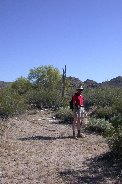
Paul pauses in a larger wash to add proportion to the standing saguaro skeleton in the background. Some fallen ribs can be seen on the ground in front of the adjacent creosote bush, with palo verde tree behind it.
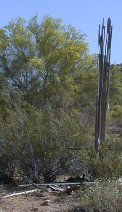
A close-up gives a better view of the saguaro spines that served many purposes for the native Indians in the past - to name just two: structure for their homes and tools for picking the hard-to-reach saguaro fruit.
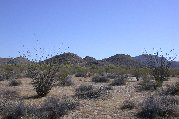
Two ocotillos add to the quiet desert scenery. These are small and sparse on the small leaves that appear on the stalks when water is ample; only a few stalks have flame-like groups of blooms visible at the ends.
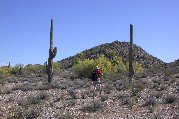
Paul heads up the small hill still outside the Gila River Indian Reservation. The power lines visible in the distance on the left are on the reservation.
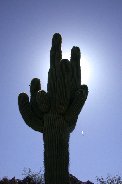
As Kitty passed by this saguaro she realized that it blocked out much of the sun. When she viewed the shot immediately afterwards, she saw that she had captured the beginning contrail of a jet passing overhead.
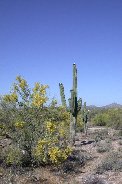
Looking westward down the slight gradient picks up 3 saguaros in this view. These majestic cacti grow in a fairly narrow range of altitude and are still not plentiful at this point. The palo verde full of yellow flowers resembles at a distance the forsythia that blooms at this same time of year in the eastern US and Canada.
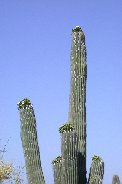
A closer look at the same saguaro reveals a multitude of buds on each arm, a few blooming.
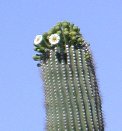
The "official" flower of Arizona is the saguaro bloom, which typically appear at the beginning of May. With its thick petals this white flower looks almost waxy. The fruit that will result are a favorite of birds and were picked regularly by the native Indians in the past to be eaten as treats. This is where those long sturdy saguaro ribs came in handy to grasp the difficult to reach fruit; this is not a "tree" one climbs or shakes ;>)  Jellies and syrup from the fruit can still be obtained since there are modern Indians and others who take the time to harvest, prepare and market them.
Jellies and syrup from the fruit can still be obtained since there are modern Indians and others who take the time to harvest, prepare and market them.
The cactus wren atop this saguaro flower has a wait - fruit won't be ready till early July.
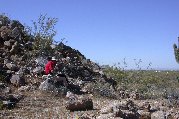
Paul took no time in getting down to breakfast once we'd climbed far enough up to find a sufficiently comfortable rock and have a view to enjoy. It had taken only about 40 minutes to walk this far but that was long enough to be really hungry.
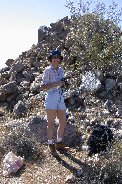
Kitty was snapping previous pictures while Paul was too hungry to wait. She kept interrupting her breakfast to look at distant sights with the binoculars.
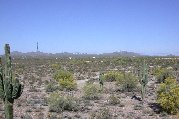
Looking to the west, a billboard and a thin stream of traffic mark Interstate 10 in its more N-S portion between Tucson and Phoenix.
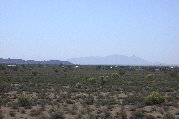
Our house is somewhere slightly left of center in the group of homes in the distance. The Picacho Mountains are in the slight mist far to the southeast; Tucson lies another 35 miles beyond.
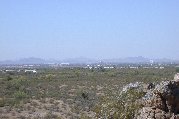
"Town" is in the distance to the southwest with small communities of homes between the town and Kitty atop this rocky hill just south of the Gila River Indian Reservation.
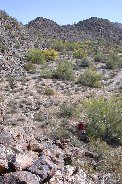
Kitty captures view of Paul as he investigates among the rocks at bottom of the hill, waiting for her to satiate her desire to photographically record "everything" ;>) It was starting to "warm up" and he was ready to head home, having had enough sun for one day.

The power lines just visible here are just inside the boundary of the Gila River Indian Reservation.
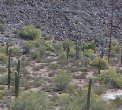 If one looks very closely, the uprights for the barbed wire fence boundary line can just be seen in the close-up, to the right of bottom center.
If one looks very closely, the uprights for the barbed wire fence boundary line can just be seen in the close-up, to the right of bottom center.
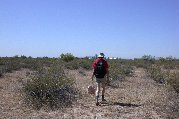
Paul carries our trash as he heads back towards the houses in the distance. Ours is somewhere off to the left beyond those visible.
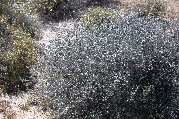
Kitty will have to look up the name of this plant in our resource books when we get back to our house on the next trip. In the months generally from May to December, this plant which only grows along washes looks absolutely dead, but will renew again with the next winter rains. In a cropped close-up, the minute pink-purple flowers can be seen delicately distributed among grayish green pointed stems.
In the months generally from May to December, this plant which only grows along washes looks absolutely dead, but will renew again with the next winter rains. In a cropped close-up, the minute pink-purple flowers can be seen delicately distributed among grayish green pointed stems.
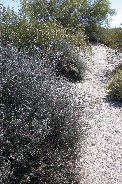 Another of this same type of plant nearby. Kitty has always admired this resilient plant which "offers up" its beauty to the observant desert hiker in the cool months.
Another of this same type of plant nearby. Kitty has always admired this resilient plant which "offers up" its beauty to the observant desert hiker in the cool months.
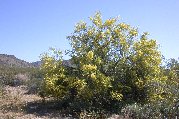
Another full blooming palo verde tree along the way as we headed home.
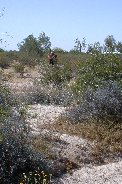
Paul keeps on going as Kitty catches a glimpse of him after exiting another wash.
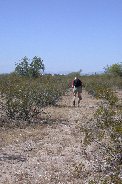
But Paul stops here to pick out annoying stickers that collected in his socks. He's been thinking on devising some knee-high breathable "chaps" to protect his legs ;>)
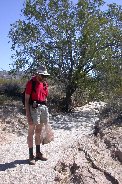
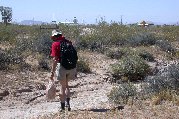
The roots of ironwood trees, one behind Paul in picture to far left, run outward in addition to downward. This large root along the surface of this wash extends more than 100 feet from the tree. These slow growing very dense wood trees produce a lovely display of faint pink flowers in June which are a favorite of local bees; the resulting honey is a delicacy.
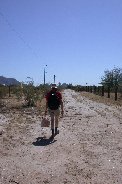
Less than 10 minutes later, we were turning off one of the N-S dirt road and heading east again down the lane (alleyway) between properties.
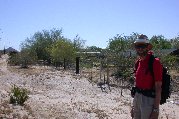
Our neighbor to the west is in the landscaping business - mainly for commercial enterprises - and maintains an interesting collection of low water usage plants at the back of his property, some outside and others in greenhouses.
- and maintains an interesting collection of low water usage plants at the back of his property, some outside and others in greenhouses.
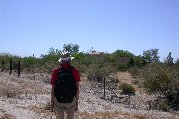
Our property line's northwest corner begins at the furthest most railroad tie post at Paul's left. The outbuilding, which will now house our outdoors related possessions, is the one at the far right.
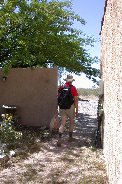
Almost there. Paul passes between outbuilding and side wall on the way to the garage.
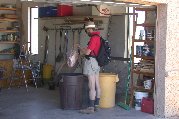
Emptying the garbage - mostly picked up along the way - the last chore.
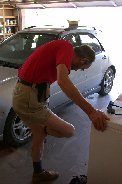
Oh yes. Take those socks off that have collected prickles from the dried desert brush.
It was a very pleasant walk, but it was also time to call it quits as the sun rose higher in the sky. The hike which lasted a bit under 2 hours was enough sun for serious life-extensionists like us.
This wasn't our last walk in the desert areas near our house. We took a couple more before leaving for Toronto on May 20th, but Kitty didn't take the camera along on those - maybe next year ;>)
 |
 |